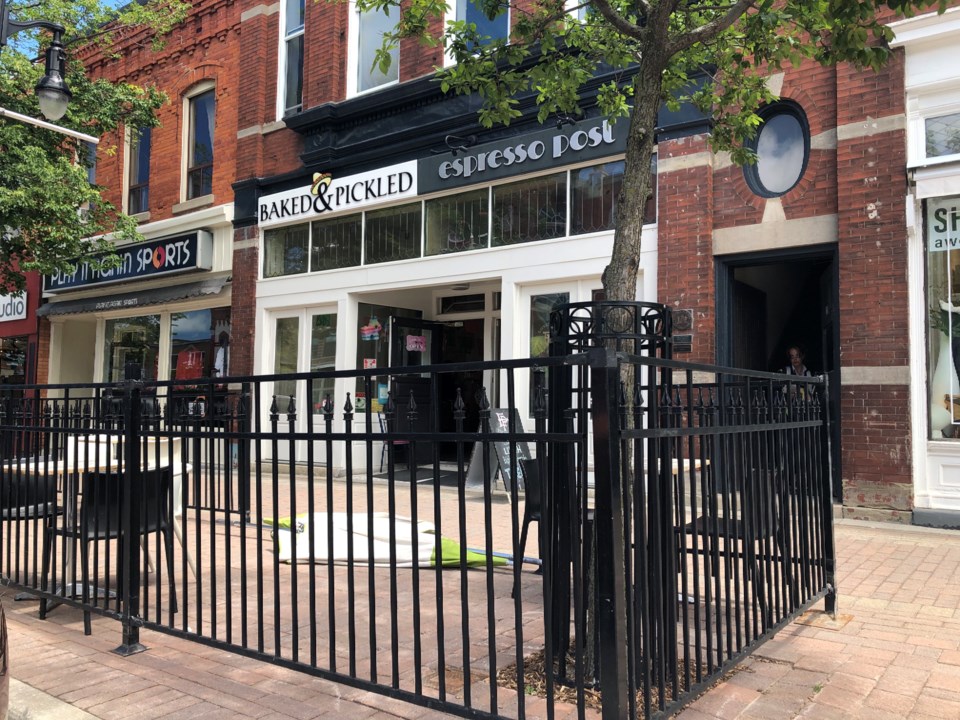The Town of Collingwood may be experimenting with pedestrian-only streets in Collingwood to make room for expanded patios.
With council’s blessing, staff is working on a pilot project to close Simcoe Street east of Ste. Marie Street as early as Thursday, June 25.
The plan as it stands now is to close the street to vehicle traffic from June 25 to 28 and again from July 2 to 5 and report back to council after those two weekends on the success of the project.
Deputy Clerk Becky Dahl said she’s still soliciting feedback from the businesses, property owners and residents who would be affected by the closure. She’ll be gathering feedback until the end of day tomorrow.
“Based on the feedback received, we may need to alter the configuration of the closures, but won’t know until I hear back from everyone,” said Dahl.
The proposal would leave a 6.5-metre lane in the middle of the road as a bike lane and for use by emergency vehicles if needed. The restaurants would be permitted to use a portion of the street for an extended patio, and retailers could put out merchandise.
Provided they can get written agreement from neighbours, restaurants and cafes could also extend their patio to the spaces adjacent to their storefronts.
The pilot project is part of a list of recommendations brought by staff to council on Monday. Staff fast-tracked a report to bring forward bylaws that would allow local restaurant and cafe owners to get permits for temporary extensions of their patios.
Council approved the bylaws granting authority to Dahl and Clerk Sarah Almas to approve encroachment permits for local businesses, in order to allow them to use parking space and more sidewalk space to extend their patios.
As of last weekend, patios are permitted to open, but tables must be spaced apart two-metres.
Dahl told council most of the existing patio space downtown would only fit about two tables, however with some relaxation on the rules of what materials can be used for fencing and the space restaurants can occupy, they could have more tables.
“They still won’t be able to have the same capacity they did pre-COVID, but at least it gives them the opportunity to get up and going again,” said Dahl.
As a result of the council votes Monday, Dahl and Almas can now approve applications from local businesses for patio extensions.
Dahl said today (June 18) she and Almas have already approved an application from Low Down to extend their patio.
While the materials for a patio will be more lenient now, Dahl and Almas will still have to approve the materials used to border the patio space.
Dahl said they will be partial to black and something that still works with the heritage esthetic. The town’s permanent bylaw requires patios be bordered in black iron fencing, but that will be more lenient under the temporary measures.
Business owners can request to extend their patios into areas currently used for street parking, and staff can now approve those “encroachment permit” requests. However, staff can suspend or revoke the permit if a public health and safety issue should arise.
Dahl said there will need to be a one-metre setback from any moving traffic and a patio border.
Council also approved a request to reduce the speed limit on Hurontario Street to 40 km/hour to accommodate extended patios.
Those establishments licensed to sell liquor do not have to apply to the Alcohol and Gaming Commission of Ontario for a patio extension, but must get permission from the town and can only extend onto property adjacent to their storefront.
Restaurants with patio space on private property can also apply directly to staff for an expansion. The town’s planning director, Adam Farr, has been delegated authority to approve those applications.
All of the extensions granted through this new process will be temporary for this season.
Council approved a budget of $40,000 to allow staff some spending money to cover costs such as barriers and signage needed to accommodate the pilot projects.

